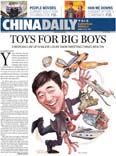Foreign and Military Affairs
China urges US to protect investors
Updated: 2011-04-19 22:10
(Agencies)
BEIJING/TOKYO - China told Washington on Tuesday to protect investors in its debt after Standard & Poor's threatened to lower its credit rating on the United States.
S&P slapped a negative outlook on the United States' top-notch AAA credit rating on Monday and said there was at least a one-in-three chance it could cut it eventually unless warring politicians found a way to slash a yawning budget deficit within two years.
If investors start demanding higher returns for holding riskier US debt, the rise in bond yields could erode the value of Treasuries held in currency reserves and push borrowing costs up, putting the global economic recovery in jeopardy.
"We hope the US government will take responsible policies and measures to safeguard investors' interests," the Chinese foreign ministry said in a statement.
China's foreign exchange reserves, the world's biggest, rose by nearly $200 billion in the first quarter to $3.05 trillion. About two-thirds are estimated to be invested in dollars.
DEBT PILE
Beijing has repeatedly warned that loose US monetary policy threatens the dollar, but it has continued to accumulate dollar assets at the same time, adding about $260 billion of Treasury securities last year, according to US data.
Policymakers in Europe, where interest rates are rising and debt is being cut, have also voiced concern.
European Central Bank official Lorenzo Bini-Smaghi said S&P's warning showed the United States must move quickly towards more restrictive economic and monetary policy now its recovery is gaining strength.
"If a shift is delayed, problems pile up and imbalances grow," Bini-Smaghi told Italy's Radio 24, calling the S&P move "a warning".
Li Jie, the head of the China Foreign Exchange Reserve Research Center, an academic institute with the Central University of Finance and Economics in Beijing, said S&P's warning would ring alarm bells for Beijing and may drive it to cut the share of Treasuries in its holdings.
"It's widely believed that US Treasuries make up about 70 percent in China's foreign exchange reserves, but China may cut the proportion to 50 percent or less in the coming decade," Li said.
Achieving such a shift without spooking the market and driving down Treasury prices would be no small feat, however.
The danger of a US downgrade could also draw unwanted attention to Japan's huge debt burden, which is likely to grow as the government secures funding to rebuild after last month's devastating earthquake and tsunami.
Japan is set to compile an extra budget worth about 4 trillion yen ($48.4 billion) and that is likely to be the first of several spending packages. Japan's public debt is already twice the size of its $5 trillion economy.
PUSH TO ACT?
Some investors hoped S&P's threat may put pressure on the White House and the US Congress to reach a compromise on measures on deficit reduction.
The White House last week announced plans to cut $4 trillion from the deficit over the next 12 years, mostly through spending cuts and tax hikes on the rich. Congressional Republicans want deeper spending cuts and no tax increases.
"The gap between the two sides seems immense but this warning of a rating downgrade might help them reach an agreement," said Arihiro Nagata, manager of foreign bond trading at Sumitomo Mitsui Banking Corp.
That was a sentiment echoed by a source familiar with managing South Korea's foreign exchange reserves, which currently top $291 billion.
"I think this is a good development in a sense that this will eventually help spur efforts in the United States to improve its fiscal health," said the source.
E-paper

Han me downs
Traditional 3,000-year-old clothes are making a comeback.
Reaching out
Fast growth fuels rise in super rich
Chinese tourists spend more
Specials

Big spenders
More mainland tourists are expected to spend money on overseas travel this year.

Rise in super rich
Report cites rising property prices, gdp as key drivers of increasing number of chinese millionaires.

Reaching out
Condom makers are stepping up their presence in smaller cities to boost sales
